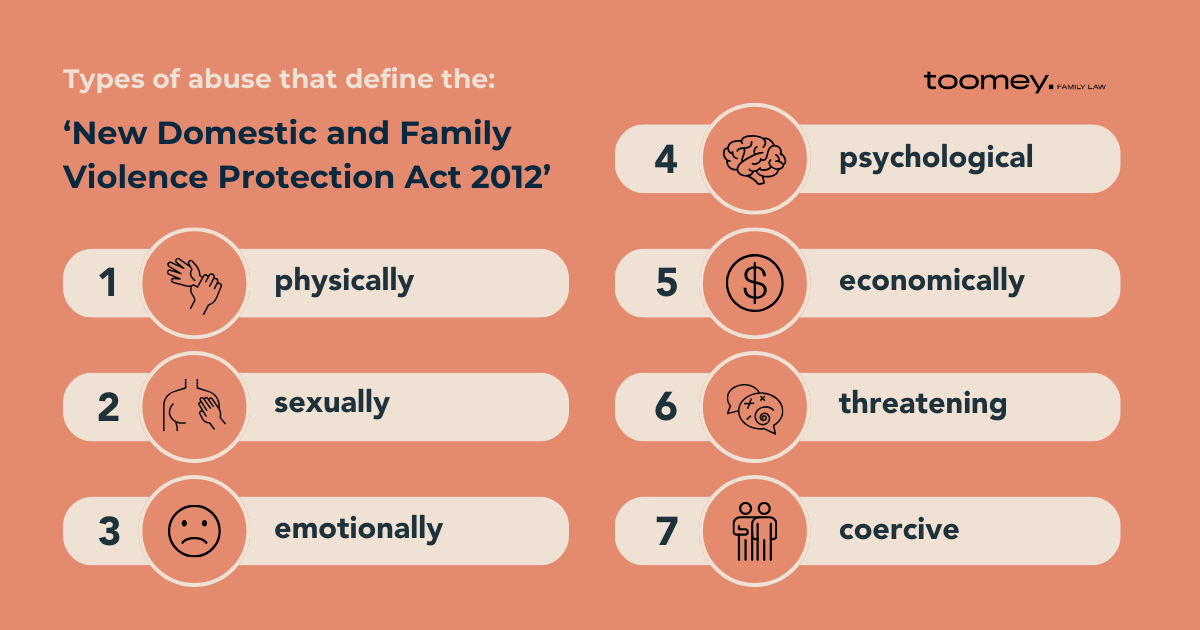
27 Oct Your 2023 Guide to the New Domestic and Family Violence Protection Act 2012
Domestic and family violence is something that happens far too often in our country. 2023 statistics show that an approximately 4.2 million Australians aged 18 years and over ‘have experienced violence, emotional abuse, or economic abuse by a cohabiting partner since the age of 15’. As our awareness grows and the law attempts to keep up with the reality of the situation, legislation amendments are necessary.
On 1 August 2023, the Australian government brought the Domestic and Family Violence Protection (Combating Coercive Control) and Other Legislation Amendment Act 2023 into effect. This resulted in significant amendments to Queensland’s Domestic and Family Violence Protection Act 2012.
Let’s take a closer look at the updates, and what they mean for Queensland families.

What is the Domestic and Family Violence Protection Act 2012?
The Domestic and Family Violence Protection Act 2012 (the Act) aims to ‘provide for protection of a person against violence committed or threatened by someone else if a relevant relationship exists between the persons’. It states that the Parliament of Queensland recognises that living free from violence is a human right and fundamental social value.
It defines domestic violence as a behaviour, or a pattern of behaviour, by one person towards another with whom they’re in a relationship that:
(a) is physically or sexually abusive; or
(b) is emotionally or psychologically abusive; or
(c) is economically abusive; or
(d) is threatening; or
(e) is coercive; or
(f) in any other way controls or dominates or causes the other person to fear for their safety or wellbeing or the safety or wellbeing of someone else.
What recent changes have been introduced?
There are a number of amendments to the Act. But some of the key changes include the following:
Cross-applications
Cross applications are where two people apply for a domestic violence order (DVO) against each other in court. In the new amendments to the Act, if there are cross applications in the same court, the court must hear the applications together and decide who is the person ‘most in need of protection’.
During this review, the court will then dismiss the person’s application who is not the most need of protection so that there is only one DVO in force. That is, unless (in some exceptional circumstances) there is strong evidence that both parties need protection from the other.
While we are yet to see what this will really mean in practice, there are some initial concerns about this requirement of the courts to identify the person most in need of protection. In particular, there are some who worry that this test doesn’t reflect the complexities of human relationships, including LGBTIQA+ relationships. There is also concern that this test could create a worsened situation in situations where the victim of domestic violence has been misidentified.

Provision of respondent’s criminal and domestic violence history to the court
The police are now required to give the respondent’s criminal and domestic violence history to the court before seeking a DVO or issuing a police protection notice. And the court must consider this history when deciding if a protection order is necessary.
The court may also consider this history when deciding whether to vary a domestic violence order (DVO) or to make a temporary protection order if the court considers it is relevant to do so.
This is a new procedural requirement that the police must meet.
DVOs by consent
Before deciding whether to make or vary a DVO by consent, the court may conduct a hearing in relation to the particulars of the application, if the court considers it is in the interest of justice. The court may also consider the respondent’s criminal and domestic violence history if it considers it is relevant to do so.
Costs
The court may now award costs against the party who made the application to engage in systems abuse or legal abuse or where the application is made on grounds that are malicious, deliberately false, frivolous or vexations.
The second situation is quite clear (though it may be complicated to prove), but the first situation is referring to situations where a person is attempting to use the legal system to intentionally control, dominate or torment another person. If the court finds these to be true, they will dismiss the case and order the person who made the application to pay court costs.

Substituted service
The court may now make an order substituting another way for a police officer to serve the document on the respondent (a ‘substituted service order’). This is after reasonable attempts have been made to personally serve the document on the respondent. The court will order a substituted service in order to protect the aggrieved, and where it is ‘reasonably likely’ to bring the document to the attention of the respondent.
Reopening proceedings
If a respondent to an application to make or vary a protection order was served under a ‘substituted service order’, they may apply to the court to reopen the proceedings. The court has discretion to reopen proceedings if it is satisfied that certain grounds have been established, e.g., they could not reasonably have been brought to the respondent’s attention, and the respondent was not present in court when the application was heard and decided.
The respondent must make an application to reopen within 28 days of becoming aware.

What can I do if I’m experiencing domestic violence?
There are also many other different pathways for seeking help. The Queensland Government has links to various services and organisations that can help you, whether you need to find suitable housing options, financial assistance or information on keeping your children safe. You can also report domestic violence and abuse, or get legal help and free professional assistance.



